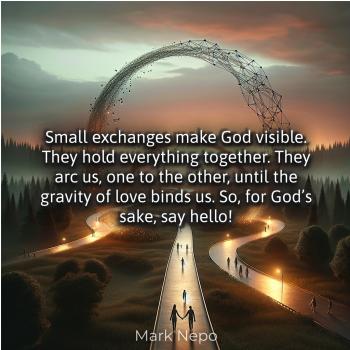 This world was meant to be our Eden. In the beginning God designed this place to be our permanent home. In the garden we were at home with God, with ourselves, with others. We were so at home that we did not give thought to pain, death, decay; these ideas were completely foreign for us. Imagine a world where these things did not exist. We were at one with God and with all other things that he had made. Since the Fall, much has changed. As a recap: creation was cursed because of our disobedience to God, and from the time of the Fall the world saw decay, disease, and death.
This world was meant to be our Eden. In the beginning God designed this place to be our permanent home. In the garden we were at home with God, with ourselves, with others. We were so at home that we did not give thought to pain, death, decay; these ideas were completely foreign for us. Imagine a world where these things did not exist. We were at one with God and with all other things that he had made. Since the Fall, much has changed. As a recap: creation was cursed because of our disobedience to God, and from the time of the Fall the world saw decay, disease, and death.
The most solemn moment of the church calendar for me is on Ash Wednesday, when the minister says, "From dust you came, and to dust you shall return." That puts things in perspective for me: all my toiling and all my labor... it adds up to very little in the end. Though things may seem urgent in the moment, from an eternal prospective very little of what we see today will have lasting value or even be remembered.
Perhaps that's why Paul so eloquently states that of faith, love, and hope, the greatest and most enduring of these things is love. The greatest of these characteristics is love because love so exactly aligns itself with the nature of the Trinity. It is one of those virtues that connect heaven and earth.
We are told many times in the New Testament that since the Fall our spiritual selves feel out of place, especially to the believer. "But our citizenship is in heaven, and from it we await a Savior, the Lord Jesus Christ, who will transform our lowly body to be like his glorious body, by the power that enables him even to subject all things to himself" (Philippians 2:20-21). Even our very bodies tell us that this is not our home, that one day Jesus will come and the realms of heaven and earth will be made anew. Anyone needs to live but for a decade past their early 20s to see that decay begins to set in. All of life tells us there is something else that awaits us, something to sustain us, a Christian hope.
Even with all our present aspirations and dreams, why is it that we can toil our way into grand abundance and yet feel strangely empty, devoid of spiritual life? It doesn't make much sense. At some point, some of us attain our goals: a safe neighborhood, good schools, high-paying incomes, a few trips abroad a year, and self-worth that is given through our ascent in the work world. And yet why does it not give life when our dream is achieved? We labor and we strive (and at times even succeed), so why is it that many of us wallow in a mire of discontent?
I think the historic Christian answer would have to go something like this: It isn't our abundance that damns us but rather our relative poverty, a poverty which comes from lack -- the absence of our relationship with God; a relationship epitomized by love, steadfastness, faithfulness, and peace. These are the things we find missing.
An important way to view the scriptures is as a narrative of a love affair between God and people. God is passionate about reaching his people. His steadfastness, his patience, his love shown to us through Christ Jesus, his mercy, his desire to be in relationship with us knows no bounds. He uses all means at his disposal to help us understand his great and steadfast love for us, and yet many of us never experience this reality, for we are too caught up in the pleasures of our heart.
One of the most obvious ways God shows his love and compassion to us is through the creation itself. Much of his concern and provision for us is still shown through what he has made through the creation. The seasons for rain, the food we get from all of creation, plants and animals, the birds of the air, the lilies of the field. If we can see God's provision in these things, surely we can see his compassion expressed in the Lord's creation of a beloved pet.
Yet, like the other things God uses to show his love and compassion, many of us ignore creation. Most of us could not name the trees outside of our homes or office buildings, and very few of us are aware of the state of America's waterways, oceans, air pollution, or our changing climate.
We need to remember that when we disregard the creation, when we destroy and degrade the earth with no regard to future generations, what we are really saying to God is that this home that you made for us to live in is of no value and concern to me. We say to the one who took great pleasure in creating this world, us in particular, that we have no regard for His order or His purposes in this world.
Shockingly, many believers take this same approach. They point to scriptures that seem to say that the earth will be destroyed by an all-consuming fire or Christ's eminent return and our forthcoming "rapture" as good reasons to bypass worldly concerns like clean water and clean air.




